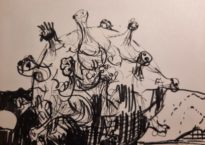Editorial. Covid-19 and the reconfiguration of the political
The editors of this first issue of the Crisis Discourse Blog are proud to be able to present a collection of carefully crafted blog posts. They look into the repercussions the pandemic has had on ‘the political’, on what constitutes our political struggle and political identities in the pandemic era. What emerges from this collection is a nuanced view of ‘the pandemic political’ and of the contribution discourse analysis can make to cognise the implications of Covid-19. It demonstrates the complementary or alternative insights that are revealed when one applies different traditions of discourse research and genres of critical reading[:]
